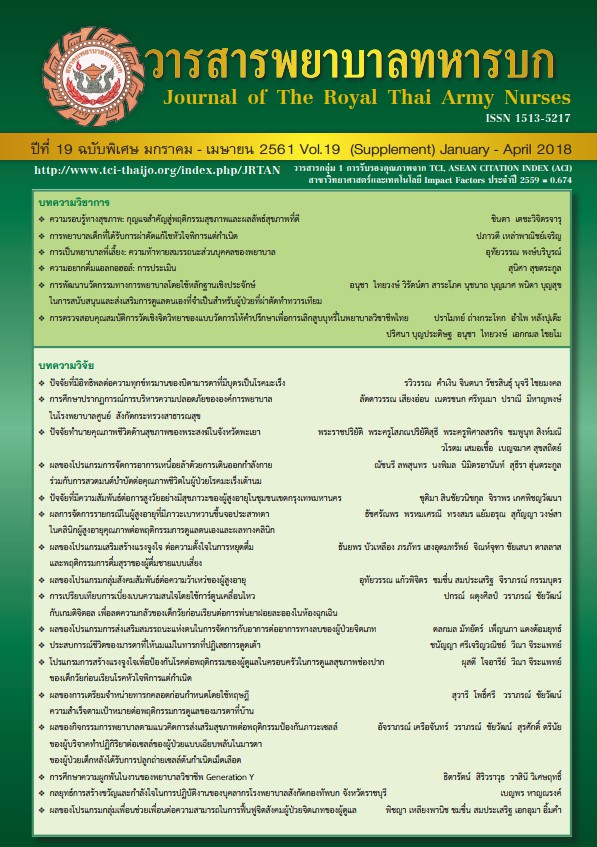Alcohol Craving: Measurement
Keywords:
Craving, Alcohol,, MeasurementAbstract
Development of the concept of alcohol craving lead to the development of measurement to assess alcohol craving. Craving is the main cause of dependence and alcohol relapse. The most effective way of assessing craving for alcohol is not only increase knowledge but also benefits for clinical treatment. With a variety of measurement is being developed, choosing appropriate measurement requires deep understanding of the measure, know the purpose of measurement, the right audience for using those measurement and the conditions of each measure must be related to the basic concepts of researcher and the purpose of that measurement.
Downloads
References
2. National Institute for Drug Abuse Treatment and Rehabilitation. Overview of the drug treatment and rehabilitation system of the country. Bangkok: Ministry of Public Health. 2016. (In Thai)
3. International Health Policy Development Office. Report on Burden of Disease and Injury of Thai People 2012. Nonthaburi: The Grafico Systems.
2013. (In Thai)
4. Potenza MN, Sofuoglu M, Carroll KM, Rounsaville BJ. Neurosience of behavioral and pharmacological treatments for addictions. Neuron. 2011; 69(4): 695-712.
5. Oslin DW, Cary M, Slaymaker V, Colleran C, Blow FC. Daily ratings measures of alcohol craving during an inpatient stay define subtypes of alcohol addiction that predict subsequent for resumption of drinking. Drug Alcohol Depend. 2009; 103, 131-136.
6. Schmidt P, Helten C, Soyka M. Predictive value of obsessive-compulsive drinking scale (OCDS) for outcome in alcohol-dependent inpatients: results of 24-month follow-up study. Substance Abuse Treatment, Prevention, and Policy. 2011; 6(14):1-7.
7. Sayette MA, Shiffman S, Tiffany ST, Niaura RS, Martin, CS, Shadel WG. Methodological approaches to craving research: the measurement of drug craving. Addiction. 2000; 95: S189-S210.
8. World Health Organisation. The ICD-10 Classification of Mental and Behavioural Disorders: Clinical Descriptions and Diagnostic Guidelines, 10th
revision. Geneva:Switzerland. 2002.
9. Leggio L. Understanding and treating alcohol craving and dependence: recent pharmacological and neuroendocrinological findings. Alcohol & Alcoholism. 2009; 44 (4): 341-352.
10. Mello, N.K. Science and Alcoholism; Craving and Loss of Control in Denzin N. K., editor. The Alcoholic Society: Addiction and Recovery of
the Self. London UK: Transaction Publishers; 2009. p 259-260.
11. Webster’s New Universal Unabridged Dictionary. New York: Barnes & Noble Books.1996. 12. Drummond DC, Litten RZ, Lowman C, Hunt WA.
Craving reseach: future directions. Addiction. 2000; 95(suppl. 2): S247-S255.
13. Edwards G, Gross MM. Alcohol dependence: provisional description of a clinical syndrome. British Medical Journal. 1976; 1(6017): 1058–1061.
14. Wikler A. Recent progress in research on the neurophysiologic basis of morphine addiction. American Journal of Psychiatry. 1948; Nov.: 329-338.
15. Drummond DC, Tiffany ST, Glautier SP, Remington B. Cue exposure in understanding and treating addictive behaviors. In D. C. Drummond, S. T.
Tiffany, S. P. Glautier, & B. Remington, Addictive Behavior:cue exposure theory and practice (pp. 1-17). Chichester: John Wiley. 1995.
16. Marlatt GA, GordonJR. Relapse prevention: maintenance strategies for addictive behaviors. New York: Guilford. 1985.
17. Beck AT, Wright FD, Newman CF, Liese BS. Cognitive Therapy of Substance Abuse. New York: Guilford, 1998.
18. Butpunya Y, Uthis P, Suktrakul S. The effect of countinuting motivational interviewing telephone-based program on alcohol consumption in person with alcohol dependence. Journal of the Royal Thai Army Nurses. 2016; 17 (3): 123-131. (In Thai)
19. Niaura RS. Cognitive social learning and related perspectives on drug craving. Addiction. 2000; 95 (suppl. 2): S155-S164.
20. Pavlick M, Hoffman E, Rosenberg H. A nationwide survey of American alcohol and drug craving assessment and treatment practices. Addiction
Research & Theory.2009; 17(6): 591-600.
21. Tiffany ST. Critique of contemporary urge and craving research: methodological, psychometric, and theoretical issues. Advance in Behavior Research and Therapy. 1992; 14: 123-139.
22. Drobes DJ, Thomas SE. Assessing craving for alcohol. Alcohol Research and Health. 1999; 23: 179-186.
23. Anton RF, Moak DH, Latham P. The obsessive compulsive drinking scale: a self-rated instrument for the quantification of thoughts about alcohol and drinking behavior. Alcoholism: Clinical and Experimental Research. 1995; 19(1): 92-99.
24. Singleton EG, Tiffany ST, Henningfield JE. Development and validation of a new questionnaire to assess craving for alcohol. The 56th Annual Meeting, The College on Problems of Drug Dependence, Inc.,Volume II. (p. 289). Rockville: National Institute on Drug Abuse. 1995.
25. Raabe A, Grusser SM, Wessa M, Podschus J, Flor H. The assessment of craving: psychometric properties, factor structure and a revised version of the Alcohol Craving Questionaire (ACQ). Addiction. 2005; 100: 227-234.24.
26. Bohn MJ, Krahn DD, Staehler BA. Development and initial validation of a measure of drinking urges in abstinent alcoholics. Alcoholism: Clinical and Experimental Research. 1995; 19(3): 600-606.
27. Flannery BA., Volpicelli JR, Pettinati HM. Psychometric Properties of the Penn Alcohol Craving Scale. Alcoholism: Clinical and Experimental Research. 1999; 23 (8): 1289-1295.
28. Love A, James D, Willner P. A comparison of two alcohol craving questionaire. Addiction. 1998; 93 (7): 1091-1102.
29. Kavanagh DJ, Statham DJ, Feeney GF, Young RM, May J, Andrade J, Connor JP. Measurement of Alcohol Craving. Addictive Behavior. 2012: 1-50.
30. Suktrakul S, Unibhand J, Chaiyawat W. The Effect of Alcohol Craving Control Program on Alcohol Consumption in persons with Alcohol Dependence. Chula Medical Journal. 2010; 55 (3): 233-251 (In Thai)
31. Chaichana S, Leuboonthavatchai O, Suktrakul S. The Effect of Educative-supportive Program Emphasizing Alcohol Craving Control on Alcohol Beverage Consumption in Persons with Alcohol Dependence. Journal of Psychiatry and Mental Health. 2017; 31 (1): 104-118. (In Thai)
32. Sornla K, Uthis P. Effect of Mindfulness Training Program on Alcohol Craving of Inpatient Alcohol Dependence Receiving Detoxification Treatment. Journal of Psychiatry and Mental Health. 2014; 28 (3): 75-89. (In Thai)
Downloads
Published
How to Cite
Issue
Section
License
บทความหรือข้อคิดเห็นใดใดที่ปรากฏในวารสารพยาบาลทหารบกเป็นวรรณกรรมของผู้เขียน ซึ่งบรรณาธิการหรือสมาคมพยาบาลทหารบก ไม่จำเป็นต้องเห็นด้วย
บทความที่ได้รับการตีพิมพ์เป็นลิขสิทธิ์ของวารสารพยาบาลทหารบก
The ideas and opinions expressed in the Journal of The Royal Thai Army Nurses are those of the authors and not necessarily those
of the editor or Royal Thai Army Nurses Association.






